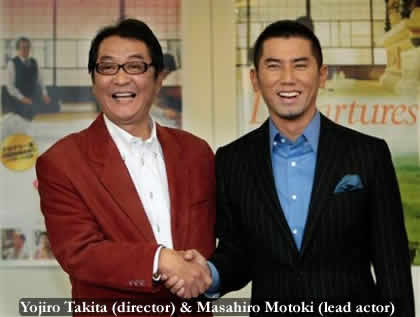 Yojiro Takita’s original and thoughtful film, Departures, is the winner of the Best Foreign Language Film for the 81st Academy Awards. I discovered it only recently, at the 20th Palm Springs International Film Festival where, from January 8-19, 2009, 50 of the 65 wonderful films that had originally qualified for an Academy Award in the Best Foreign Language Film category were screened and Departures, with a pervasive word-of-mouth buzz, won the festival’s Mercedes-Benz Audience Award for Best Narrative Feature. The film is quite beguiling.
Yojiro Takita’s original and thoughtful film, Departures, is the winner of the Best Foreign Language Film for the 81st Academy Awards. I discovered it only recently, at the 20th Palm Springs International Film Festival where, from January 8-19, 2009, 50 of the 65 wonderful films that had originally qualified for an Academy Award in the Best Foreign Language Film category were screened and Departures, with a pervasive word-of-mouth buzz, won the festival’s Mercedes-Benz Audience Award for Best Narrative Feature. The film is quite beguiling.
It’s winter in Yamagata, and traveling over the pristine white landscape of Japan’s northeast, Daigo (Masahiro Motoki) relates to us how he ended up returning to what he presumed to be a desolate place. Essentially “packing up” his sophisticated life in Tokyo as a concert cellist and heading for the provinces with his good-willed (if privately skeptical) wife, Mika (Ryoko Hirosue), Daigo faces the dilemma confronting many in the world today. He was very happy with the prestigious symphony orchestra, took great pride in playing there, and paid a lot for his cello. But the owner announces the orchestra’s being dissolved, and now Daigo feels fortunate just to be able to return to his old home that his mother left him, where she used to run a coffee house and everyone knows everyone.
Yet he doesn’t remember Sasaki (Tsutomu Yamazaki), who advertises a job concerning “departures” that catches his eye, only for Daigo to sadly discover that it’s the work of a ceremonial “encoffineer” of corpses that will be cremated. Sasaki hires him on the spot, with a sum of cash Daigo is in no position to resist, because the elderly man is looking for just the right protégé. Daigo does “travel” — over the austerely beautiful countryside as Sasaki introduces him to the local communities of the region, where some families are traditional when it comes to funeral rites but others can’t live up to their own expectations and find themselves on a collision course with those closest to them. Nonetheless, Daigo learns to usher them through the gate of life’s passing with 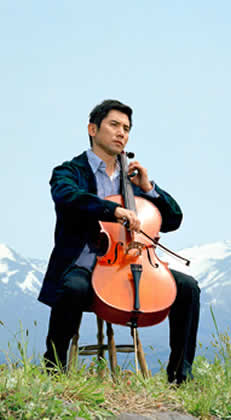 grace, beauty, and dignity.
grace, beauty, and dignity.
The encoffination ritual may be somber, but Takita peppers it with a fair amount of humor and lets us enjoy some irony. While at one point Mika departs for Tokyo again, the news she has in store for Daigo is all part of the equation — of life, death, and the fine art of living between them. With all its discretion in respecting the discipline of Japan’s traditional death rites, Departures is a very sensual film, dwelling not only on the sacred but also on the profane, if only in the sense of a tactile relation to the flesh and an acknowledgement of the “animal” presence in life. Photographer Takeshi Hamada captures a warm tranquility even as snow flurries fall over the humble village and open meadows at the base of mountain peaks.
Yojiro Takita was born in 1955. As an assistant director, he joined Hiroshi Mukai’s company, Sushi Productions, in 1976. His debut as a director was Chikan Onna Kyoshi in 1981, followed by his first commercial feature in 1986, Komikku Zasshi Nanka Iranai!, which was well received at the New York Film Festival. Following The Yen Family (1988), We Are Not Alone (1993), The Exam and Secret (both in 1999), his 2001 special-effects fantasy, Onmyoji (The Ying-Yang Master) swept the box office and led to the sequel, Onmyoji 2 in 2003. Takita was lauded in 2003 for his historical drama, When the Last Sword Is Drawn, which garnered many laurels, including Best Film at the 2004 Japan Academy Awards. Just prior to Departures, Takita directed Ashura (2005) and The Battery (2007). Departures has won Best Film, Best Director, and Best Actor at numerous festivals.
Diane Sippl: What inspired you to make this film about a person with a so-called “unfavorable” job?
Yojiro Takita: I became acquainted with the nokanshi (“encoffineer”) in reading a book, but I had never met a person who practiced this profession. The script fascinated me: although it was dealing with death, it was surprisingly uplifting. Also, I think that finding the charm in themes that other people don’t want to touch is probably the habit of all directors.
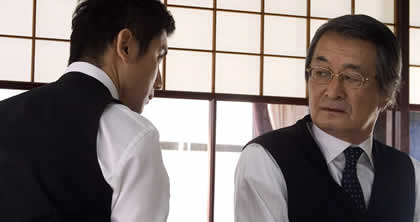 DS: Did any particular incident push you to make Departures?
DS: Did any particular incident push you to make Departures?
YT: Because my experience with death was quite limited, I was interested in the theme all the more. I had participated in ordinary funerals before, but I had never seen or thought about what was happening on the other side of the ritual and the people who were involved in that part.
When I was small, funerals often took place inside each household, and death felt very familiar, even if I didn’t realize what it was all about. While I was researching the film, I suddenly felt the presence of “death” right in front of me, just as I felt it in my childhood, when family members neither despised nor detested it.
I came to feel that “sending someone off” was beautiful, and I also discovered that one’s way of life may show in how one dies. I wanted to contrast the sadness of loss with the warmth of people at the same time.
DS: Did making Departures affect you as a person? Did you learn anything new in the process?
YT: I believe I came to face “death” more naturally. I am afraid to die, but I’m not afraid of “death” itself any more. When I used to attend funerals for those close to me, I just prayed for them, but since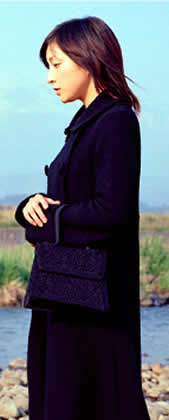 I made the film, I have found myself touching their faces and trying to confront their death. By touching their skin, I can feel the warmth of the deceased, the warm-hearted life of the person who once cared for me.
I made the film, I have found myself touching their faces and trying to confront their death. By touching their skin, I can feel the warmth of the deceased, the warm-hearted life of the person who once cared for me.
I feel the need to tell young people that death exists in everyday life and it’s important for us to witness it. We are given birth with crying, and we die crying.
DS: When you see the film now, which scenes move you the most?
YT: I like the scene in which Mashiro Motoki plays Ave Maria on the cello after eating chicken in the office with Tsutomu Yamazaki and Kimiko Yo. I think the scene captures a moment of reflection for each character, and their bonds are expressed without words.
I also like the scene in which Tetsuta Sugimoto sends off his deceased mother to be burned but is only able to say, “Ma! I’m sorry!” in the back lot of the crematory. It makes sense from a man’s point of view; it’s how a man deals with a mother’s death.
DS: How did you imagine the role of music in the film?
YT: The composer, Joe Hisaishi, and I knew from the start that the cello would be important to the film. The instrument has a very wide range from high to low keys, so it was helpful in getting the protagonist to play the tune according to his feelings. The music carries themes of reconciliation and reproduction. With the vinyl records, I wanted to convey feelings of warmth in something that is lost (or is about to be lost).
DS: Food seems to be a recurring motif in the film. Can you explain why?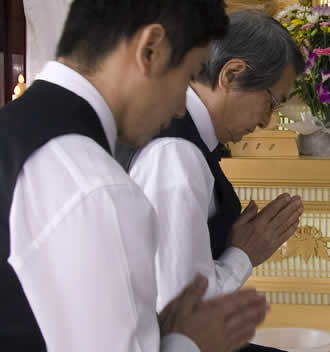 YT: I love eating sequences in a film. I think eating is the motive, the power, to live. I brought in the sequence of the fried chicken to show that life and death are actually everyday happenings when it comes to food. I also brought in the octopus as a symbol of something that looks both dead and alive.
YT: I love eating sequences in a film. I think eating is the motive, the power, to live. I brought in the sequence of the fried chicken to show that life and death are actually everyday happenings when it comes to food. I also brought in the octopus as a symbol of something that looks both dead and alive.
DS: Kundo Koyama’s script feels both sensitive and natural. Were there many revisions?
YT: The script was not originally in this style. I felt that death was not a dark incident, but a moment with humor and grace, so I changed the standpoint somewhat.
DS: In your experience, do humor and comedy travel well?
YT: That may be most difficult. Yet “jokes” and “humor” are two different things. In Japan, there are a lot of indecent jokes. Humor, on the other hand, is worldwide. I don’t like jokes that despise and disrespect people or jokes that are self-satisfying. I tried to keep a sense of heartfelt laughter through something beautiful.
DS: Are you worried about releasing the film outside of Japan?
YT: By all means, I didn’t intentionally create the film to please the worldwide audience; the film is obviously a Japanese production and set in Japan. But death is something that human beings cannot abide, and it is universal. Despite the film’s style, I would love to see how the “feelings” will travel. For example, I am very interested to see how the audience from a multi-cultured and multi-religious country like the U.S. would react.

